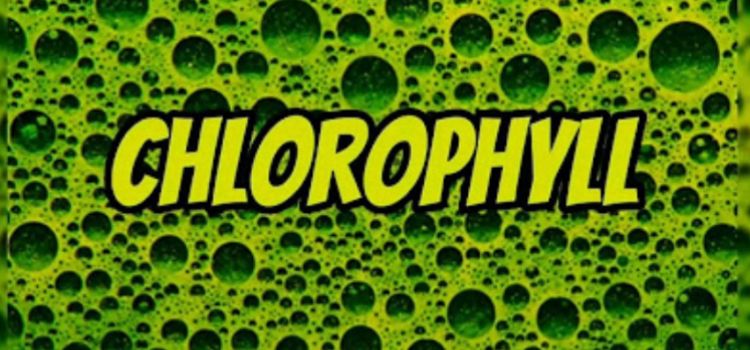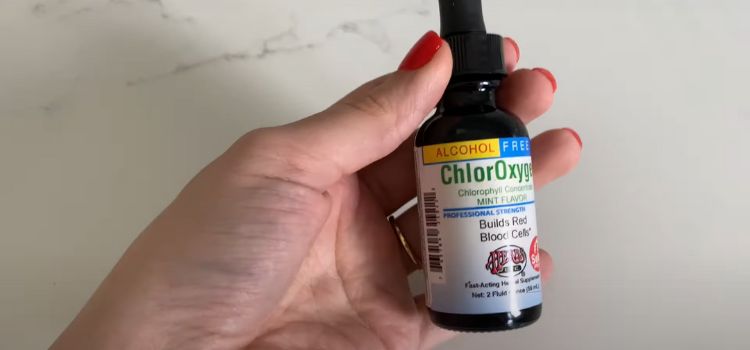Yes, you can take chlorophyll while breastfeeding, but it is recommended to avoid liquid chlorophyll unless necessary. There are no known side effects of taking chlorophyll while breastfeeding, although some people may experience mild digestive upset.

It is important to consult with your healthcare provider before starting any supplements while breastfeeding.
Understanding The Safety Of Chlorophyll During Breastfeeding

It’s safe to consume chlorophyll while breastfeeding, but liquid forms should be avoided unless necessary. Stick to natural sources such as fruits and vegetables to enjoy the benefits of chlorophyll without any risks.
Chlorophyll is a natural pigment found in plants that gives them their green color. It is often consumed as a dietary supplement due to its potential health benefits. However, if you are a breastfeeding mother, you may be wondering whether it is safe for you to take chlorophyll.
In this section, we will explore what chlorophyll is, its potential benefits, and whether it is safe for breastfeeding mothers.
What Is Chlorophyll?
Chlorophyll is a group of green pigments found in plants. It plays a vital role in photosynthesis, a process that enables plants to convert sunlight into energy. Chlorophyll can be extracted from various plant sources and is available in different forms, including liquid drops, powders, and capsules.
The Potential Benefits Of Chlorophyll
Chlorophyll has gained popularity as a dietary supplement due to its potential health benefits. Some of its notable benefits include:
- Powerful antioxidant properties: Chlorophyll is known for its antioxidant properties, which can help protect cells from damage caused by harmful free radicals.
- Detoxification: Chlorophyll is believed to have detoxifying effects in the body by helping to eliminate toxins and heavy metals.
- Digestive support: Chlorophyll may aid digestion by promoting the growth of beneficial gut bacteria and reducing the risk of digestive issues.
- Skin health: Chlorophyll has been associated with improved skin health and may help reduce acne and other skin-related problems.
Is Chlorophyll Safe For Breastfeeding Mothers?
When it comes to the safety of chlorophyll during breastfeeding, there is limited research available. However, chlorophyll is generally considered safe for consumption, including by breastfeeding mothers.
It is important to note that individual reactions may vary, and it is advisable to consult with your healthcare provider before introducing any new supplements into your routine.
Here are a few key points regarding the safety of chlorophyll during breastfeeding:
- Limited research: While there is limited research specifically investigating the effects of chlorophyll on breastfeeding mothers, no adverse effects have been reported to date.
- Individual reactions: Every individual is unique, and some may experience unexpected reactions to certain substances. Therefore, it is always recommended to consult with your healthcare provider before starting any new supplement while breastfeeding.
- Medication interactions: If you are taking any medications regularly, it is essential to discuss with your healthcare provider before incorporating chlorophyll into your routine. Some medications may interact with chlorophyll and could potentially pose risks.
While chlorophyll is generally considered safe for breastfeeding mothers, it is always advisable to consult with your healthcare provider before starting any new supplement.
They can provide personalized guidance based on your specific circumstances and help ensure the safety and well-being of both you and your baby.
Factors To Consider Before Taking Chlorophyll While Breastfeeding

While chlorophyll consumption is generally safe, its effects on breastfeeding women and infants are not fully understood. It is crucial to prioritize the health and well-being of both mother and baby before making any decisions.
Assessing your overall health and medical history:
- Determine if you have any pre-existing medical conditions that may interact with chlorophyll supplements.
- Consider any allergies or sensitivities you may have to certain substances that could be found in chlorophyll.
- Evaluate your overall health and ensure that you are in a stable condition before considering taking any supplements.
Consulting with your healthcare provider:
- Schedule an appointment with your healthcare provider or a lactation consultant to discuss the potential use of chlorophyll while breastfeeding.
- Seek their professional advice on whether it is safe for you to take chlorophyll supplements considering your specific circumstances.
- Share any concerns or questions you may have regarding the safety and potential benefits of chlorophyll for breastfeeding mothers.
Understanding potential risks and side effects:
- Be aware of the potential risks and side effects associated with chlorophyll supplements.
- Educate yourself on any known adverse reactions or interactions that may occur.
- Consult reliable sources of information, such as healthcare professionals or reputable websites, to ensure you have accurate knowledge.
It’s crucial to assess your overall health and medical history, consult with your healthcare provider, and understand potential risks and side effects before considering taking chlorophyll while breastfeeding.
Assessing your overall health and medical history involves determining if you have any pre-existing medical conditions that may interact with chlorophyll supplements, considering any allergies or sensitivities you may have, and evaluating your overall health.
Consulting with your healthcare provider is essential, as they can provide professional advice tailored to your specific circumstances. Additionally, they can address any concerns or questions you may have regarding the safety and potential benefits of chlorophyll.
Understanding potential risks and side effects is crucial to make an informed decision. Be aware of any potential adverse reactions or interactions and consult reliable sources of information to ensure you have accurate knowledge.
Research And Expert Opinions On Chlorophyll And Breastfeeding
Chlorophyll is a popular supplement known for its potential health benefits, including detoxification, body odor reduction, and immune support. However, when it comes to taking chlorophyll while breastfeeding, it’s essential to consider the available research and seek expert opinions to ensure the safety of both the mother and the baby.
Let’s explore the current research and insights from healthcare professionals on this matter.
Current Research On The Safety Of Chlorophyll While Breastfeeding
- While there isn’t specific research on the safety of chlorophyll supplements during breastfeeding, it’s generally wise to exercise caution and consult with a healthcare professional.
- Studies are needed to examine the potential effects of chlorophyll on breast milk production, composition, and the baby’s overall health.
Insights From Healthcare Professionals And Experts
- Medical experts and lactation consultants often recommend avoiding certain supplements while breastfeeding due to potential risks.
- Many healthcare professionals suggest that it is best to err on the side of caution and refrain from taking chlorophyll supplements during this stage.
Studies And Evidence Supporting Or Cautioning Against Chlorophyll Usage
- It’s important to note that there is limited scientific evidence specifically addressing the safety of chlorophyll while breastfeeding.
- However, some studies have highlighted potential risks associated with certain ingredients commonly found in chlorophyll supplements.
- Since the purity and quality of supplements can vary, it is crucial to choose reputable brands and consult with healthcare professionals for advice.
Remember, the health and wellbeing of both the breastfeeding mother and the baby are of utmost importance. As there is limited research on chlorophyll’s safety during breastfeeding, it is best to consult with your healthcare provider to make an informed decision that suits your individual circumstances.
Alternative Methods To Boost Wellness While Breastfeeding
While breastfeeding, it is generally considered safe to consume chlorophyll, as it is a natural compound found in plants. However, it is recommended to avoid liquid chlorophyll unless necessary and to opt for chlorophyll-rich fruits and vegetables instead.
Natural Dietary Alternatives To Chlorophyll
- Spinach: Rich in iron, which is essential for breastfeeding mother
- Kale: Packed with vitamins A, C, and K, as well as calcium and folate.
- Broccoli: High in antioxidants, vitamins C and K, and fiber.
- Spirulina: A blue-green algae that is nutrient-dense and can provide protein, iron, and other essential nutrients.
- Wheatgrass: A concentrated source of vitamins, minerals, and antioxidants.
Other Supplements And Vitamins Suitable For Breastfeeding Mothers
- Omega-3 fatty acids: Found in fish oil supplements, these are crucial for the development of your baby’s brain and eyes.
- Calcium: Essential for maintaining strong bones and teeth. Look for supplements that contain calcium citrate or calcium carbonate.
- Vitamin D: Supports calcium absorption and bone health. It is recommended for breastfeeding mothers to take a daily vitamin D supplement.
- Probiotics: Beneficial for both mother and baby’s gut health. Look for a high-quality probiotic supplement.
- Iron: Important for preventing iron deficiency anemia. Talk to your healthcare provider about the appropriate iron supplement dosage for breastfeeding mothers.
Lifestyle Changes To Enhance Overall Health During Breastfeeding
- Prioritize a well-balanced diet: Focus on consuming plenty of fruits, vegetables, whole grains, lean proteins, and healthy fats.

- Stay hydrated: Drink an adequate amount of water throughout the day to maintain proper hydration levels.
- Get enough rest: Sleep deprivation can negatively impact both your mental and physical well-being. Aim for 7-8 hours of uninterrupted sleep each night.
- Engage in gentle exercise: Incorporate light exercises like walking, yoga, or swimming into your routine to improve overall fitness and mood.
- Manage stress: Find healthy ways to cope with stress, such as practicing mindfulness, deep breathing, or engaging in hobbies that bring you joy.
Remember to always consult with your healthcare provider before adding any supplements or making significant changes to your diet while breastfeeding. By following these natural dietary alternatives, including suitable supplements and implementing lifestyle changes, you can enhance your overall health and well-being while breastfeeding.
Frequently Asked Questions
What Supplements Should I Avoid While Breastfeeding?
When breastfeeding, it is best to avoid supplements such as aloe latex, ashwagandha, bilberry, black cohosh, and berberine/goldenseal. Additionally, some greens powders may not be suitable for nursing mothers. It is also recommended to consult with a doctor before taking chlorophyll or chlorophyllin supplements while breastfeeding.
Can You Take Greens Supplements While Breastfeeding?
Yes, it is generally safe to take greens supplements while breastfeeding. However, it is important to check the ingredients and consult with your healthcare provider to ensure they are appropriate for nursing mothers.
Can Chlorophyll Supplements Interact With Medications Commonly Used During Breastfeed?
Chlorophyll supplements may interact with medications, and this is particularly important for breastfeeding individuals. If you are taking any medications, especially anticoagulants, consult with your healthcare provider before using chlorophyll supplements.
Who Should Not Take Liquid Chlorophyll?
Pregnant and breastfeeding women should avoid taking liquid chlorophyll.
Final Words
There are no known side effects of taking chlorophyll while breastfeeding. However, some people may experience mild digestive upset, such as an upset stomach or diarrhea.
It is important to consult with your healthcare provider before taking any supplements while breastfeeding to ensure the safety and well-being of both you and your baby. While chlorophyll is generally considered safe, it is always best to err on the side of caution and seek professional medical advice.
If you do choose to supplement with chlorophyll while breastfeeding, be sure to choose a reputable brand and follow the recommended dosage. Remember to prioritize a healthy and balanced diet to ensure optimal nutrition for both you and your nursing baby.
Leave a Reply